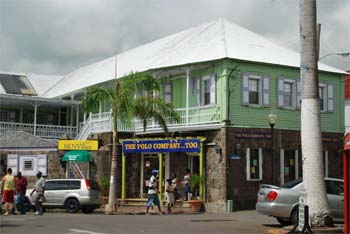Saint Kitts and Nevis (/-ˈkɪts ... ˈniːvɪs/ ⓘ), officially the Federation of Saint Kitts and Nevis, is an island country consisting of the two islands of Saint Kitts and Nevis, both located in the West Indies, in the Leeward Islands chain of the Lesser Antilles. With 261 square kilometres (101 sq mi) of territory, and roughly 48,000 inhabitants, it is the smallest sovereign state in the Western Hemisphere, in both area and population, as well as the world's smallest sovereign federation. The country is a Commonwealth realm, with Charles III as King and head of state.
The capital city is Basseterre, located on the larger island of Saint Kitts. Basseterre is also the main port for passenger entry (via cruise ships) and cargo. The smaller island of Nevis lies approximately 3 km (2 mi) to the southeast of Saint Kitts, across a shallow channel called The Narrows.
The British dependency of Anguilla was historically also a part of this union, which was known collectively as Saint Christopher-Nevis-Anguilla. However, Anguilla chose to secede from the union in 1967, and remains a British overseas territory. The islands of Sint Eustatius, Saba, Saint Barthélemy, Saint-Martin/Sint Maarten and Anguilla lie to the north-northwest of the country. To the east and northeast are Antigua and Barbuda, and to the southeast is the small uninhabited island of Redonda (part of Antigua and Barbuda) and the island of Montserrat.
Saint Kitts and Nevis were among the first islands in the Caribbean to be colonised by Europeans. Saint Kitts was home to the first British and French Caribbean colonies, and thus has also been titled "The Mother Colony of the West Indies". It is also the most recent British territory in the Caribbean to become independent, gaining independence in 1983.
